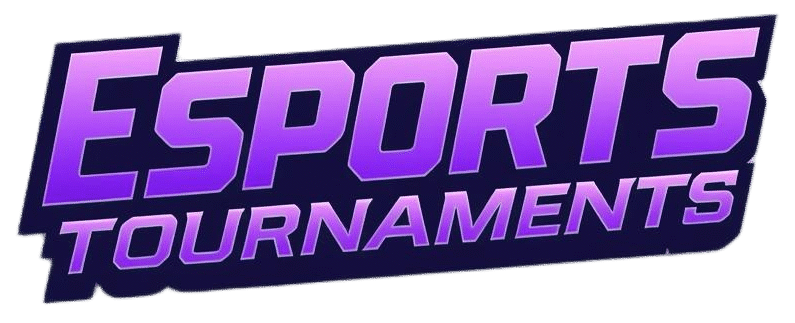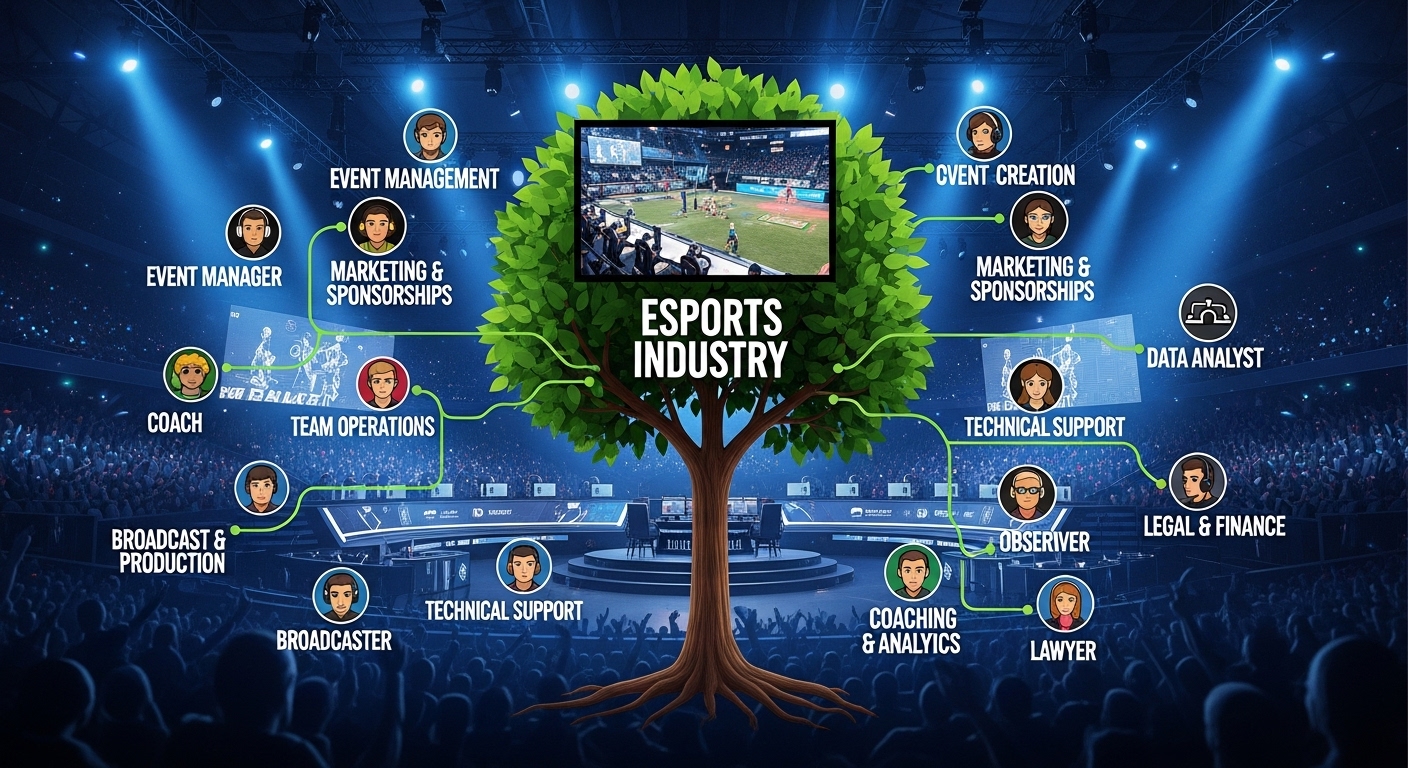Esports has transformed from a niche hobby into a global industry worth billions of dollars. While professional players often steal the spotlight, the truth is that the esports ecosystem is powered by a vast network of people working behind the scenes. For every star player competing on stage, there are dozens of professionals building teams, managing events, running broadcasts, marketing brands, and keeping the business side of gaming alive.
This means that careers in esports extend far beyond playing competitively. If you are passionate about gaming but don’t see yourself as a pro player, there are still countless ways to build a successful and fulfilling career in this industry.
In this article, we’ll explore the wide range of non-playing esports careers, the skills they require, salary expectations, and how to break into the industry. Whether you’re a student, gamer, or aspiring professional, this guide will help you understand the growing opportunities in esports beyond the controller.
The Growth of Esports as a Career Path
Before diving into specific roles, it’s important to understand why esports has become a viable career path.
- Massive Industry Value: The esports industry generated over $1.5 billion globally in 2024, with growth projected in sponsorships, streaming, and merchandising.
- Global Reach: Millions of fans worldwide tune in to events like The International (Dota 2), League of Legends World Championship, and CS:GO Majors.
- Diverse Job Opportunities: Esports functions like a mix of sports, entertainment, and tech, creating unique careers in content creation, event management, marketing, data analytics, and more.
- Transferable Skills: Many esports careers overlap with traditional industries such as sports management, broadcasting, or digital marketing, making them versatile and future-proof.
Why Esports Careers Go Beyond Playing
Only a small percentage of players make it to the top tier of professional esports. Just like in traditional sports, the majority of enthusiasts won’t become LeBron James or Lionel Messi—but they can still work in the industry they love.
Behind every esports tournament, there are jobs in:
- Production and broadcasting
- Team management and coaching
- Event planning and operations
- Marketing, PR, and sponsorships
- Game development and design
- Journalism, content creation, and streaming
- Data analytics and esports research
These roles ensure that esports continues to thrive as both a business and a form of entertainment.
Careers in Esports Beyond Playing
Let’s break down the major categories of esports careers, their responsibilities, skills required, and growth potential.
1. Esports Coaching and Analysis
Just like traditional sports, esports teams rely on coaches, analysts, and strategists to improve performance.
- Head Coach: Responsible for team strategies, reviewing gameplay, and training players.
- Analyst: Breaks down gameplay data, identifies strengths/weaknesses, and prepares reports for coaches.
- Assistant Coaches: Focus on specific areas like individual mechanics, communication, or mental training.
Skills Needed:
- Deep understanding of the game
- Analytical thinking
- Communication and leadership
- Experience in competitive play (not always pro-level)
Salary Range: $40,000 – $100,000+ depending on the game and team.
2. Broadcasting and Production
Esports events are global spectacles streamed live to millions. Behind those streams are production crews and broadcasters.
- Casters/Commentators: Provide play-by-play narration and analysis.
- Observers: Control in-game cameras for live streams.
- Producers & Directors: Coordinate event flow, camera angles, and transitions.
- Technical Crew: Handle sound, lighting, graphics, and streaming tech.
Skills Needed:
- Knowledge of the game and esports scene
- Public speaking (for casters)
- Technical expertise in broadcasting software/hardware
- Creativity in presentation
Salary Range: $30,000 – $90,000; star casters may earn much more.
3. Event Management
Esports tournaments can be as large as music festivals. That requires event planners and operations managers.
- Event Coordinator: Organizes logistics like venues, equipment, and scheduling.
- Stage Manager: Oversees live stage production.
- Tournament Organizer (TO): Runs brackets, rules enforcement, and match scheduling.
Skills Needed:
- Project management
- Communication and leadership
- Logistics and planning
- Problem-solving under pressure
Salary Range: $40,000 – $80,000; large events pay higher.
4. Marketing, Sponsorships, and PR
Brands are pouring millions into esports. Careers in marketing and sponsorships are critical.
- Esports Marketer: Runs social media, ad campaigns, and fan engagement.
- Sponsorship Manager: Connects teams/events with brands for funding.
- PR Specialist: Manages public image and media relations.
Skills Needed:
- Digital marketing expertise
- Brand management
- Networking and negotiation
- Social media fluency
Salary Range: $45,000 – $120,000 depending on experience and company size.
5. Team Management and Operations
Esports teams function like businesses. They need managers and administrators.
- General Manager (GM): Handles contracts, recruitment, and budgets.
- Team Manager: Manages player schedules, travel, and daily operations.
- HR Roles: Handle contracts, benefits, and team culture.
Skills Needed:
- Business management
- Negotiation and leadership
- Financial and organizational skills
Salary Range: $50,000 – $100,000+. Top orgs pay much more.
6. Content Creation and Streaming
Content is king in esports. Players and teams need content creators to engage fans.
- Streamers: Entertain audiences with live gameplay.
- YouTube/TikTok Creators: Produce highlight videos, analysis, or lifestyle content.
- Editors & Graphic Designers: Support content with visuals and branding.
Skills Needed:
- Video editing and production
- Social media knowledge
- Creativity and consistency
Salary Range: Highly variable; from $20,000 for beginners to millions for top influencers.
7. Esports Journalism and Media
Esports needs storytellers who can cover matches, report news, and write analysis.
- Journalists: Write for websites, magazines, or online publications.
- Interviewers/Hosts: Conduct player and coach interviews at events.
- Analysts/Columnists: Provide deep dives into strategies, business, and culture.
Skills Needed:
- Writing and communication
- Research and analytical ability
- Understanding of esports ecosystem
Salary Range: $30,000 – $70,000; freelance income varies.
8. Game Development and Design
While not directly “esports,” game developers play a crucial role. Developers often hire community managers and esports liaisons to support competitive ecosystems.
- Game Designers: Balance games for competitive play.
- Community Managers: Connect developers with players.
- Esports Coordinators: Ensure competitive rules and updates are fair.
Skills Needed:
- Game design and coding (for devs)
- Communication and project management (for liaisons)
- Knowledge of esports community needs
Salary Range: $60,000 – $120,000+.
9. Data Analytics and Esports Research
Data drives esports. From performance analysis to audience tracking, data experts are in high demand.
- Performance Analysts: Track in-game data for coaching.
- Market Analysts: Study fan engagement, sponsorship ROI, and audience trends.
- Business Intelligence Roles: Help orgs make data-driven decisions.
Skills Needed:
- Data science and analytics tools
- Excel, SQL, or Python
- Critical thinking and reporting
Salary Range: $55,000 – $100,000+.
10. Mental Health and Performance Support
Competitive gaming is mentally demanding. Many teams hire sports psychologists and wellness coaches.
- Esports Psychologist: Helps players manage stress, focus, and performance.
- Nutritionists/Fitness Trainers: Maintain health and stamina.
- Life Coaches: Support personal development outside gaming.
Skills Needed:
- Psychology or health background
- Communication and empathy
- Knowledge of esports lifestyle
Salary Range: $40,000 – $90,000.
Skills Needed to Succeed in Esports Careers
Even beyond playing, esports careers require a unique set of skills:
- Passion for gaming and esports
- Networking: Building industry relationships is key
- Adaptability: The industry evolves quickly
- Digital fluency: Understanding social media, streaming, and online communities
- Professionalism: Meeting deadlines, contracts, and expectations
How to Break into an Esports Career
- Start Small – Volunteer at local tournaments or create fan content.
- Build a Portfolio – Showcase work (writing, editing, streaming, or data).
- Network Actively – Attend conventions, join Discord communities, follow industry leaders.
- Stay Updated – Know the latest esports trends, games, and business moves.
- Leverage Transferable Skills – Marketing, business, or IT skills can translate directly.
The Future of Non-Player Careers in Esports
The esports industry is only growing, and so are career opportunities beyond playing. With streaming platforms, AR/VR, mobile esports, and AI-driven analytics, new jobs will continue to emerge.
By 2030, we could see careers in:
- Virtual esports venue management
- AI-driven coaching
- Augmented reality broadcasting
- Esports law and player rights advocacy
Conclusion
Esports isn’t just about playing—it’s about the massive ecosystem that supports the players and entertains millions of fans. From coaching, production, and event management to marketing, journalism, and wellness, the industry offers career paths for almost every skill set.
If you love gaming but don’t see yourself competing professionally, you can still build a thriving career in esports. Whether you’re a storyteller, a business mind, a creative designer, or a tech wizard, the future of esports has a place for you.

